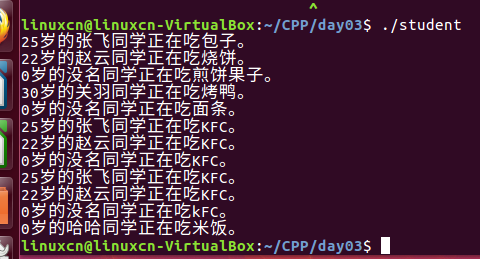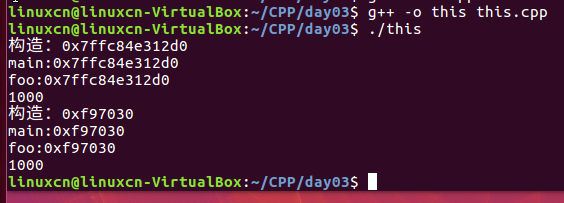5.3-day03-C++构造函数/this指针/析构函数
四、
5.构造函数
class 类名 {
...
类名 (形参表) {
构造函数体;
}
};
当一个对象被创建时,构造函数会自动被执行,其参数来自构造实参。
int i = 10;
int i (10);
6.构造函数可以通过构造参数实现重载
7.如果一个类没有定义任何构造函数,那么系统就会缺省地为其提供一个无参构造函数,该构造函数对于基本类型的成员变量不做初始化,对于类类型的成员变量,调用其相应类型的无参构造函数初始化。
8.对象的创建过程
分配内存->调用构造函数
->调用类类型成员的构造函数->构造函数的代码
9.初始化表
class 类名 {
类名(...) : 初始化表 {
构造函数体;
}
};
const int x = 100;
x = 100;
int& a = b;
a = b;
1)如果类中含有常量或引用型的成员变量,必须通过初始化表对其初始化。
2)成员变量的初始化顺序仅于其被声明的顺序有关,而与初始化表的顺序无关。
class A {
public:
A (char* psz) : m_str (psz),
m_len (strlen (psz)) private:
size_t m_len;
string m_str;
};
练习:实现一个Clock类支持两种工作模式,计时器和电子钟。
00:01:00
14:05:37
#include <iomanip>
cout << setw (10) << setfill ('0') << 12;
0000000012
Clock
时、分、秒
走 - 显示、滴答
五、this指针
1.一般而言,在类的构造函数或成员函数中,关键字this表示一个指针,对于构造函数而言,this指向正在被构造的对象,对于成员函数而言,this指向调用该函数的对象。
2.this指针的用途
1)在类的内部区分成员变量。
2)在成员函数中返回调用对象自身。
3)在成员函数内部通过参数向外界传递调用对象自身,以实现对象间交互。
老 -问题-> 学
师 <-答案- 生
class A {
B& m_b;
};
class B {
A& m_a;
};
sizeof (A) ?
class C {
C m_c;
};
六、常函数与常对象
1.如果在一个类的成员函数的参数表后面加上const关键字,那么这个成员函数就被称为常函数,常函数的this指针是一个常指针。在常函数内部无法修改成员变量,除非该变量具有mutable属性。而且在常函数内部也无法调用非常函数。
2.常对象:拥有const属性的对象,对象引用或指针。
常对象只能调用常函数。
同型的常函数和非常函数可以构成重载关系。常对象调用常版本,非常对象调用非常版本。如果没有非常版本,非常对象也可以调用常版本。
const XXX 函数名 (const YYY yyy) const {
...
}
七、析构函数
class 类名 {
~类名 (void) {
析构函数体;
}
};
当一个对象被销毁时自动执行析构函数。
局部对象离开作用域时被销毁,堆对象被delete时被销毁。
如果一个类没有定义任何析构函数,那么系统会提供一个缺省析构函数。缺省析构函数对基本类型的成员变量什么也不干,对类类型的成员变量,调用相应类型的析构函数。
一般情况下,在析构函数中释放各种动态分配的资源。
构造:基类->成员->子类
析构:子类->成员->基类
1.cpp
#include<iostream>usingnamespace std;void foo (constint& a){cout << a << endl;}int main (void){char c ='A';foo (static_cast<int>(c));return0;}

静态类型转换:
static_cast <目标类型>(源类型变量)
argthis.cpp
#include<iostream>usingnamespace std;classStudent;classTeacher{public:void educate (Student* s);void reply (const string& answer){m_answer = answer;}private:string m_answer;};classStudent{public:void ask (const string& question,Teacher* t){cout <<"问题:"<< question << endl;t->reply ("不知道。");}};voidTeacher::educate (Student* s){s->ask ("什么是this指针?",this);cout <<"答案:"<< m_answer << endl;}int main (void){Teacher t;Student s;t.educate (&s);return0;}
voidTeacher::educate (Student* s){ s->ask ("什么是this指针?",this); cout <<"答案:"<< m_answer << endl;clock.cpp
#include<iostream>#include<iomanip>usingnamespace std;classClock{public:Clock(bool timer =true):m_hour (0), m_min (0), m_sec (0){if(! timer){time_t t = time (NULL);tm* local = localtime (&t);m_hour = local->tm_hour;m_min = local->tm_min;m_sec = local->tm_sec;}}void run (void){for(;;){show ();tick ();}}private:void show (void){cout <<'\r'<< setfill ('0')<< setw (2)<< m_hour <<':'<< setw (2)<< m_min <<':'<< setw (2)<< m_sec << flush;// printf ("\r%02d:%02d:%02d", m_hour,// m_min, m_sec);}void tick (void){sleep (1);if(++m_sec ==60){m_sec =0;if(++m_min ==60){m_min =0;if(++m_hour ==24)m_hour =0;}}}int m_hour;int m_min;int m};int main (void){Clock clock (false);clock.run ();return0;}
<< setw (2)<< m_hour <<':'<< setw (2)<< m_min <<':'<< setw (2)<< m_sec << flush;
setw 设置预宽;
m_hour 指定填充字符;
cout << ......<< endl; ‘\n’
cout << ......<< flush; "把缓冲区里的东西冲刷到屏幕上"
constfunc.cpp
#include<iostream>usingnamespace std;class A {public:// void bar (void) {// cout << "非常bar" << endl;// }void bar (void)const{cout <<"常bar"<< endl;}// void XXXbarYYY (A* this) {}void foo (void)const{// m_i = 100;const_cast<A*>(this)->m_i =100;}void print (void)const{cout << m_i << endl;}// _ZNK1A3fooEv (const A* this) {// const_cast<A*>(this)->m_i = 100;// }int m_i;};void func (void)/*const*/{}int main (void){A a;a.foo ();a.print ();const A& r = a;r.bar ();// XXXbarYYY (&r); // const A*a.bar ();// XXXbarYYY (&a); // A*return0;}
init.cpp
#include<iostream>usingnamespace std;int g_data =1000;class A {public:A (void): m_c (100), m_r (g_data){// m_c = 100;/// m_r = g_data;}void print (void){cout <initc <<' '<< m_r << endl;}private:constint m_c;int& m_r;};int main (void){A a;a.print ();return0;}

integer.cpp
#include<iostream>usingnamespace std;classDouble{public:Double(double data):m_data (newdouble(data)){cout <<"构造"<< endl;}~Double(void){cout <<"析构"<< endl;delete m_data;}void print (void)const{cout <<*m_data << endl;}private:double* m_data;string m_lable;};int main (void){// {Double d1 (3.14);d1.print ();// }Double* d2 =newDouble(1.23);delete d2;cout <<"再见!"<< endl;return0;}
main.cpp
#include"s.h"// 使用Student类int main (void){Student s ("张飞",25);s.eat ("包子");return0;}
retthis.cpp
#include<iostream>usingnamespace std;classCounter{public:Counter(void): m_data (0){}Counter& inc (void){++m_data;return*this;}void print (void){cout << m_data << endl;}private:int m_data;};int main (void){Counter c;// c.inc ();// c.inc ();// c.inc ();c.inc ().inc ().inc ();c.print ();// 3return0;}
s.h
#ifndef _S_H#define _S_H#include<string>usingnamespace std;// 声明Student类classStudent{public:Student(const string& name ="",int age =0);void eat (const string& food);private:string m_name;int m_age;};#endif// _S_H
s.cpp
#include<iostream>usingnamespace std;#include"s.h"// 实现Student类Student::Student(const string& name /* = "" */,int age /* = 0 */): m_name (name),m_age (age){}voidStudent::eat (const string& food){cout << m_name <<","<< m_age <<","<< food<< endl;}
student.cpp
#include<iostream>usingnamespace std;class A {public:A (int a){}g++ g};classStudent{private:string m_name;int m_age;A m_a;public:void eat (const string& food){cout << m_age <<"岁的"<< m_name<<"同学正在吃"<< food <<"。"<< endl;}// void _ZN7Student3eatERKSs (Student* this,// const string& food) int{// cout << this->m_age << "岁的"<<this->m_name// << "同学正在吃" << food << "。" << endl;// }void setName (const string& name){if(name =="2")cout <<"你才"<< name <<"!"<< endl;elsem_name = name;}void setAge (int age){if(age <0)cout <<"无效的年龄!"<< endl;elsem_age = age;}// 构造函数Student(const string& name,int age):m_a (100){m_name = name;m_age = age;}// 无参构造Student(void): m_a (100){m_name ="没名";m_age =0;}// 单参构造Student(const string& name): m_a (100),m_name (name), m_age (0){m_name ="哈哈";}};int main (void){Student s1 ("张飞",25);s1.eat ("包子");// _ZN7Student3eatERKSs (&s1, "包子");Student s2 =Student("赵云",22);s2.eat ("烧饼");// _ZN7Student3eatERKSs (&s2, "烧饼");Student s3;s3.eat ("煎饼果子");Student* s4 =newStudent("关羽",30);s4->eat ("烤鸭");delete s4;Student& s5 =*newStudent();s5.eat ("面条");delete&s5;Student sa1[3]={s1, s2};sa1[0].eat ("KFC");sa1[1].eat ("KFC");sa1[2].eat ("KFC");Student* sa2 =newStudent[3]{s1, s2};// 2011sa2[0].eat ("KFC");sa2[1].eat ("KFC");sa2[2].eat ("KFC");delete[] sa2;Student s6 ("刘备");s6.eat ("米饭");return0;}

this.cpp
#include<iostream>usingnamespace std;class A {public:A (int data): data (data){cout <<"构造: "<<this<< endl;:set cursorline// this->data = data;}void foo (void){cout <<"foo: "<<this<< endl;cout <<this->data << endl;}int data;};int main (void){A a (1000);cout <<"main: "<<&a << endl;a.foo ();A* pa =new A (1000);cout <<"main: "<< pa << endl;pa->foo ();delete pa;}




this指针:
一般而言,在类的构造函数或成员函数中,关键字this表示一个指针,
对于构造函数而言,this 指向正在被构造的对象,对于成员函数而言,
this指向调用该函数的对象。
<wiz_tmp_tag id="wiz-table-range-border" contenteditable="false" style="display: none;">






